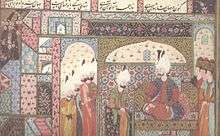Alqas Mirza
| Alqās Mīrzā | |
|---|---|
 Alqas Mirza meeting Suleiman the Magnificent. Illustration from the Süleymanname. | |
| Safavid governor of Astarabad | |
| Reign | 1532/33-1538 |
| Safavid governor of Shirvan | |
| Reign | 1538-1547 |
| Predecessor | Hossein Beg Shamlu |
| Successor | Abdullah Khan Ustalju |
| Safavid governor of Darband | |
| Reign | 1546-1547 |
| Born | 15 March 1516 |
| Died |
9 April 1550 (aged 34) Qahqaha fortress, near Tabriz |
| Dynasty | Safavid dynasty |
| Father | Ismail I |
| Religion | Shia Islam |
Abu'l Ghazi Sultan Alqas Mirza (Persian: ابوالقاسم قاضی سلطان آل قصبه میرزا), better known as Alqas Mirza (آل قصبه میرزا; b. 15 March 1516 - d. 9 April 1550), was a Safavid prince and the second son of king (shah) Ismail I (r. 1501–1524). In early 1546, with Ottoman help, he staged a revolt against his brother Tahmasp I (r. 1524–1576), who was king at the time.
Biography
Of the four sons that survived of Ismail I, Alqas was the second one. Sam Mirza was probably his full brother, while Bahram Mirza and (the future king) Tahmasp were brothers born by other mothers. In 1532/33, he was given the governorship of Astarabad by Tahmasp (by that time king), while Badr Khan Ustajlu was made his regent (lala). In March 1538 Tahmasp I ordered Alqas with his regent to move against the rebel Shirvanshah, and six months later he was appointed governor of Shirvan, where he remained for the next eight years. During the frequent Caucasian campaigns under Tahmasp's tenure, Alqas was ordered to attack the Circassians, who however defeated him. Afterwards, he was appointed governor of Derbent (Darband). He started to openly revolt there, which included minting his own coins. Upon hearing of this, Tahmasp, at that time in a winter campaign in Georgia, started to march upon Derbent. Alqas subsequently fled Derbent, to Crimea, while by early 1547, Tahmasp had already re-taken Derbent.
As Crimea passed into Ottoman hands at that time, Alqas moved to Istanbul by sea, arriving there towards the end of summer 1547.[1] At Istanbul, he contacted the Ottoman sultan Suleiman, explaining his reason of departure from Iran, as well as his desire to return there as an Ottoman client. Upon hearing this, Suleiman hastily moved from Edirne to meet the exiled Alqas,[1] who promised strong Qizilbash support if Suleiman might help him, and he may have converted to Sunnism.
See also
References
- 1 2 Şahin 2013, p. 117.
Sources
- Fleischer, C. (1989). "ALQĀS MĪRZA". Encyclopedia Iranica. Retrieved 6 February 2016.
- Necipogulu, Gulru; Roxburgh, David J. (2000). Muqarnas: An Annual on the Visual Culture of the Islamic World, Volume 17. BRILL. pp. 149–. ISBN 978-9004116696.
- Şahin, Kaya (2013). Empire and Power in the Reign of Süleyman: Narrating the Sixteenth-Century Ottoman World. Cambridge: Cambridge University Press. ISBN 978-1107034426.